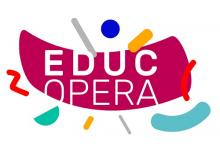EducOpera- An education to Opera as a Method of Reducing Early School Leaving
Marco Bartolucci, Bénédicte Halba, Mojca Kovačič (eds) et Marco Bartolucci, Federico Batini, Jesus Boyano, Federico Campos, Christian Christrup Kjeldsen, Bénédicte Halba, Mojca Kovačič , Dirk Michel-Schertges, Niels Rosendal Jensen, Alberto Santoro
- Publication : 2019
- Université de Perouse (Italie)
- 140 pages
- EducOpera
While the factors leading to early school leaving vary from country to country (Recommendation on policies to reduce early school leaving, EC, 2011), the causes of ineffective policies can be boiled down to three typical deficiencies : 1. lack of a comprehensive strategy ; 2. lack of evidence-based policy-making ; 3. insufficient prevention and early intervention.
Learning music enhances a cognitive, emotional, physical and social development of youngsters and is a main source of creativity. Musical education and more generally artistic education as soon as possible is most necessary for children to become adults open on the world, with the relevant knowledge and critical thinking for sharing values with the future generations (Suzana Kubik, France Musique, 2016). In an approach based on praxis, according to David J. Elliot, rhetorician in education and musician, education to music is more pragmatic than esthetic. Antti Juvonen states that « in the heart of pedagogy is the musical experience. Pupils are asked to play the instruments and to sing in order to better understand the music not as an abstraction, but through practice and sensations it reveals. Acting for feeling and understanding before learning a theoretical knowledge, this is the methodological principle». At school, education to music is part of compulsory education.
Musical education tackles three main objectives : listening to music, playing and/or composing the music, building a musical and artistic education.
Three main pedagogical actions are implemented: listening, playing and composing. In complement of the formal education, many extra-curricular activities are offered such as choirs in the framework of schools or outside schools with annual concerts to play the work done all the yearlong.
Moreover, education to music combines much knowledge : history, literature, or sciences. Therefore it plays a specific role in transversal pedagogical strategies and multidisciplinary learning (such as history of arts). Many opportunities are offered to youngsters outside school to play the music: in association, in conservatories...
Education to opera allows an opening of youngsters to artistic culture (most favored by Key competence 8) with a cultural practice which used to be a popular one. This pedagogical approach is a main asset for creativity (key competence 7) and therefore for a harmonious personal development. The opera involves disciplines such as music, drawing, sports, dance. Education to Opera may reveal hidden talents, it enhances a collective and team spirit, it improves culture and knowledge, it allows to acquire various competences, to master one’s body, concentration and breathing, it stimulates memory, it combines written and oral expression in mother tongue or a foreign language (key competence 1 & 2) , it develops the personality of the teenagers, it is a main asset for empowerment.
This ebook is the final product of the EducOpera project. It is a Guide for professional trainers so that they will be able to explain the EducOpera approach to other teachers/educators working both inside and outside school in music education. The hope is that it would be efficient pedagogical support to combat early school leaving (ESL). The validity of the approach from the perspective of the final beneficiaries (students) takes the form of "learning to learn" and represents a way to conceive of personal development as a continuous dialogue between formal, non formal and informal learning.






























































